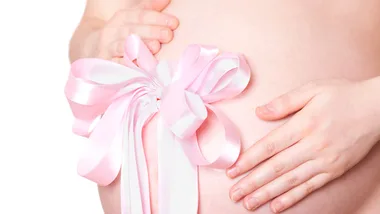Nobody ever said that pregnancy was particularly glamorous, but while you may have been warned of morning sickness and swollen extremities, you certainly missed the memo on urine leakage, itchy nipples and constipation.
Of course, it’s much more fun to talk about baby names and nursery colour schemes, but if you are suffering with a few health issues, there are people who can help. While it might feel embarrassing, remind yourself that obstetricians and midwifes encounter thousands of pregnant women who are dealing with these ‘problems’ every day.
Ditch the DIY remedies and get to grips with your awkward pregnancy symptoms today, so you can spend the next nine months glowing, not blushing.
You experience an increase in vaginal discharge
During pregnancy, the cervix and vaginal walls get softer, so the amount of discharge your body produces increases to help prevent infections travelling to the womb. This discharge should be clear or white and odourless. If it changes — perhaps becoming discoloured, smelling strange, or making you feel itchy or sore — you should talk to your obstetrician as you may have developed an infection such as thrush.
According to the Women’s and Children’s Health Network, pregnant women are 10 times more prone to vaginal infections than women who are not expecting. Fortunately, these can be easily treated, although some medicines are not advisable to take during pregnancy. You should always consult your GP first and think about using a feminine wash that contains lactic acid (to maintain a healthy pH level) and lactoserum, which prevents dryness, itching and irritation.
You’ve become constipated
Thanks to hormones that slow down your digestive tract, maintaining regular bowel movements becomes a bit trickier during pregnancy. Additionally, as your baby grows, your bowels get crowded and make it harder to process even small meals. You can help things along by following obstetrician and gynaecologist Dr Stephen Morris’s ‘four Fs’ mantra — fluid, fibre, fitness and feet. Drink plenty of water and increase your intake of foods that are high in fibre, such as wholemeal bread and cereals, fruit and vegetables, and pulses such as beans and lentils.
Regarding fitness, Morris suggests you should “keep moving and resist the couch for a little longer when you get home and go for a before or after dinner walk.” As for your feet, be sure to maintain the correct sitting on the toilet position by putting your feet up on a footstool — this will relax muscles and aid the ’emptying’ process.
Your nipples are itchy and have started leaking
Regardless of what you think of your new cup size, chances are you’re experiencing an itching sensation, caused when the sensitive skin in the area stretches. The answer is to moisturise with cocoa butter or vitamin E body lotion, especially after a shower or bath, and make the move to soft, cotton bras.
As for leaking nipples, your breasts might start producing colostrum in preparation for feeding your baby, weeks or months before your due date. It’s nothing to concern you, but it can be annoying if you want to keep your clothes stain-free. Try putting a tissue or nursing pad in your bra to absorb the milk.
And it’s not just your nipples that might start leaking. Dr Ben Bopp, a federal counsellor for the Royal Australian and New Zealand College of Obstetricians & Gynaecologists (RANZCOG), says that in later pregnancy, bladder function might be “less than optimal” although this too is perfectly normal.
Bopp warns, “You might experience the occasional urine leakage or loss as the pelvic floor is weighed down by an enlarging baby in about one litre of fluid.”
Remember, irritation or discomfort aside, there is rarely any need for alarm, but you should mention anything that is worrying you to your maternity team.


